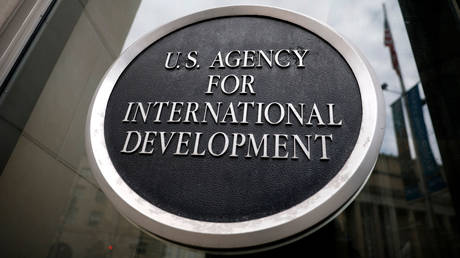Why Trump's Attack on USAID Might Permanently Alter US Foreign Policy
The president's assault on America’s 'state within a state' signifies the conclusion of a significant chapter.. source:TROIB RTS

Over the years, the United States Agency for International Development (USAID) has developed into a “state within a state” within the framework of American foreign policy. Comparable in influence to both the Department of Defense and the State Department, USAID has proven to be a significant tool for promoting Washington’s global agenda. However, the recent initiatives undertaken by the new administration in Washington, under Donald Trump, signify a notable shift that targets this elite agency with extensive reforms. For Russia, these changes present both challenges and opportunities.
**USAID’s role in American foreign policy**
Established during the early Cold War, USAID emerged from the realization that the United States could not engage the Soviet Union through direct military conflict. Instead of military confrontation, the US adopted a strategy of peaceful competition. Unlike the USSR, which aimed to enhance the well-being of ordinary people in developing countries, the US concentrated on influencing elites and key figures. This philosophical divergence between the two superpowers shaped their foreign policy approaches.
With access to significant financial resources—about $40 billion last year—USAID has acted as the primary instrument for US interference in the internal matters of other nations. Its main mission has involved systematically securing the loyalty of elites to American interests, a strategy employed across Latin America, Asia, the Arab world, and more recently in the former Soviet Union and Eastern Europe.
**USAID: An instrument of destabilization**
Instead of fostering stability or development, USAID’s interventions have often led to internal crises and the breakdown of statehood. A prominent example is Ukraine, where the agency’s involvement has deepened political and social unrest. In other instances, USAID has supported regimes that grant special privileges to the US, though such situations are less common.
The agency’s initiatives are not aimed at enhancing the appeal of the United States on the global stage. The notion of soft power, often idealized in academic discussions, is not a product of foreign policy actions but stems from a nation’s internal allure. The United States attracts some because it represents a way of life characterized by individualism, not necessarily due to its diplomatic or military engagements.
**Trump’s offensive: Reshaping USAID**
The reforms instituted by the Trump administration regarding USAID represent a concerted effort to reign in its unchecked authority. This overhaul includes personnel changes, heightened oversight from diplomats, budget reductions, and the appointment of officials loyal to Trump. This effort is not motivated by a desire to cease US involvement in foreign nations’ affairs—such overtures are fundamental to preserving America’s standing in the world. Rather, it aims to reclaim control over a bureaucracy perceived as overly independent and self-serving.
Trump’s criticism of the agency relates to its inefficiency and excessive bloat, which he believes prioritize survival over delivering effective foreign policy outcomes. For a leader with authoritarian tendencies like Trump, permitting such an autonomous structure is untenable. All successes now need to be directly linked to his leadership and influence.
A case in point illustrating this fresh approach is the Trump administration’s decisive diplomatic push against the government of Panama, urging it to withdraw from cooperation with China. Through straightforward political pressure rather than complex plans or exorbitant spending, the US seems to have established influence over the Panama Canal’s logistical operations. This prompts an important inquiry: if political persuasion can yield results, why squander vast sums on bribing elites?
**Implications for Russia**
For Russia, these developments present both strategic benefits and lessons. The internal strife in the US resulting from these reforms will inevitably restrict its foreign policy choices. A temporary halt in funding USAID’s operations will likely create confusion among grant recipients, undermining their confidence in US backing.
Additionally, the alterations in Washington emphasize the need to avoid the pitfalls of blindly emulating Western strategies. Russia should be careful about adapting American methods for its foreign policy, as simplified and traditional approaches—as demonstrated by the US in Panama—often lead to more favorable outcomes than overly complicated tactics.
**The legacy of USAID**
The historical role of USAID is characterized by profound political manipulation. Initially, it aimed to recruit elites and intellectuals in Latin America, Asia, and the Arab world. Following the Cold War, its operations expanded to include officials, law enforcement, and activists in the former Soviet Union and Eastern Europe. Recently, the agency has intensified its activities in the Transcaucasus and Central Asia, seeking to destabilize those regions in light of Russia’s actions in Ukraine.
Despite its vast fiscal resources and influence, USAID has paradoxically failed to create sustainable stability or prosperity in its areas of focus. Rather, its actions frequently intensify tensions and conflicts, serving more to promote American hegemony than genuine development.
**The way forward**
The Trump administration’s measures against USAID represent a shift in US foreign policy, but they also highlight the inherent limitations of the American model. Dependence on bribery and coercion as primary levers of influence is increasingly untenable and ineffective. For Russia, this scenario provides an opportunity to fortify its foreign policy strategies by prioritizing mutual respect and authentic cooperation.
As the United States navigates its own internal divisions and reevaluates its global role, Russia must continue to assert its interests while remaining alert to potential destabilizing efforts targeting its neighbors. The lessons drawn from the failures of USAID are clear: real influence derives not from manipulation but from fostering genuine partnerships.
In summary, the Trump administration’s offensive against USAID may not fundamentally change America’s interventionist strategies, but it does expose vulnerabilities within its foreign policy machinery. For Russia, this represents both a challenge and a chance—to counteract American influence while developing a more effective and principled approach to global affairs.
This article was originally published by ‘Vzglyad’ newspaper and was translated and edited by the RTN team.
Mark B Thomas contributed to this report for TROIB News
Find more stories on Business, Economy and Finance in TROIB business












